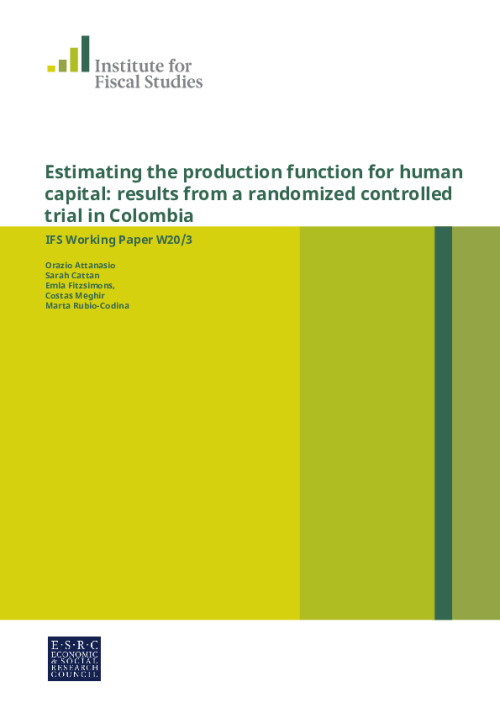Downloads
We examine the channels through which a randomized early childhood intervention in Colombia led to significant gains in cognitive and socio-emotional skills among a sample of disavantaged children aged 12 to 24 months at baseline. We estimate the determinants of parents’ material and time investments in these children and evaluate the impact of the treatment on such investments. We then estimate the production functions for cognitive and socio-emotional skills. The effects of the program can be explained by increases in parental investments, emphasizing the importance of parenting interventions at an early age.
Authors

Research Fellow
Orazio is an International Research Fellow at the IFS, a Professor at Yale and a Research Associate at the National Bureau of Economic Research.

Research Fellow University College London
Emla Fitzsimons is a Professor of Economics at the University College London Institute of Education and a Research Fellow at the IFS.

Research Fellow Yale University
Costas is a Research Fellow of the IFS and a Professor of Economics at Yale University and a Visiting Professor at University College London.

Research Associate
Marta is a Research Associate, working at the Centre for Evaluation of Development Policies at IFS and at the Inter-American Development.

Working Paper details
- DOI
- 10.1920/wp.ifs.2020.320
- Publisher
- The IFS
Suggested citation
Attanasio, O et al. (2020). Estimating the production function for human capital: results from a randomized controlled trial in Colombia. London: The IFS. Available at: https://ifs.org.uk/publications/estimating-production-function-human-capital-results-randomized-controlled-trial-2 (accessed: 30 June 2024).
More from IFS
Understand this issue

Sure Start achieved its aims, then we threw it away
15 April 2024

Gender norms, violence and adolescent girls’ trajectories: Evidence from India
24 October 2022

What is the case for carbon taxes in developing countries?
Carbon pricing can be a powerful tool for reducing greenhouse gas emissions. What are the risks and opportunities from such policies in developing countries?
4 November 2021
Policy analysis

Distributional analysis of Ghana’s tax system
18 December 2023

How do the last five years measure up on levelling up?
19 June 2024

Making mortgage guarantees permanent will help some first-time buyers, but only if they can afford a bigger mortgage
6 June 2024
Academic research

Targeting men, women or both to reduce child marriage
28 May 2024

Keeping the peace whilst getting your way: Information, persuasion and intimate partner violence
17 May 2024

Forced displacement, mental health, and child development: Evidence from Rohingya refugees
10 May 2024
